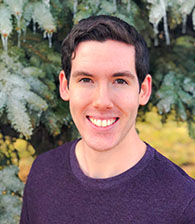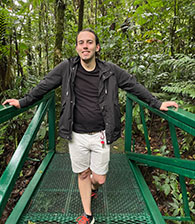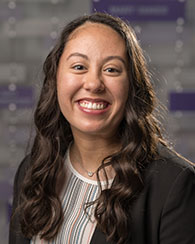Three students earn Phi Kappa Phi Study Abroad Grants
MANHATTAN — Three Kansas State University students are recipients of Phi Kappa Phi Study Abroad Grants. The grants help support undergraduates seeking knowledge and experience in their academic fields through education abroad.
Thomas Leihsing, senior in fisheries, wildlife and conservation biology, Emporia; Cole King, senior in biology and pre-medicine, Topeka; and Jenika Hazelbaker, senior in agronomy, Spanish and global food systems leadership, Wentzville, Missouri, are among the 125 students nationwide receiving the $1,000 grants in 2022.
The grant will help Leihsing study and conduct research at the Wits Rural Facility, a 350-hectare bushveld estate owned by Wits University in the Bushbuckridge region of Limpopo, South Africa.
A member of Students for Environmental Action, The Wildlife Society and the K-State Water Environment Federation, Leihsing served two terms as president of the Maitland E. Smith Scholarship House in 2020 and 2021. He is a member of the University Honors Program and served on its executive board as social media director from 2020-2021.
Leihsing assists in research on the ranges of plant species at the Konza Prairie Biological Station. He is a recipient of the Rocky Mountain Elk Foundation Leadership Award, Division of Biology Most Promising Student Award, Scott Richards Leadership Scholarship, Robert Nabours Biology Scholarship, Deb Miller-Bosco Family Scholarship and Lyon County Conservation District Scholarship. He was a 2019 Borlaug scholar, a 2022 Truman scholarship finalist and honorable mention recipient for the 2022-2023 Morris K. Udall and Stewart L. Udall Undergraduate Scholarship.
King is using the grant to study Spanish, his minor, in Costa Rica this summer. A K-State honors list student, King is a member of the University Honors Program and Biology Ambassadors. He received the Division of Biology's 2022 Most Promising Student Award. He also plays cello in the K-State Symphony Orchestra and volunteers as a student mentor.
King works in the lab of Bethany Plakke Anderson, assistant professor of psychological sciences, on a project involving developmental neurobiology of autism spectrum disorders, investigating the relationship between exercise and brain plasticity. After earning his bachelor's degree, he plans to complete a Master of Public Health at K-State while applying to medical schools.
Hazelbaker is spending eight weeks in Gambia in West Africa this summer as part of a K-State International Service Team, a program of the university's Staley School of Leadership Studies that promotes ethical service learning. She will live with a host family and work with the Sandele Foundation on sustainable agriculture projects that promote environmental stewardship and community empowerment.
A member of the University Honors Program, Hazelbaker is the current director of membership of K-State's Blue Key Senior Honorary. She also is active with Student Foundation and Sigma Delta Pi, the collegiate Spanish honors society. She served as vice president of K-State's chapter of Minorities in Agriculture, Natural Resources and Related Sciences, or MANRRS; was chair of marketing for K-State Proud; and was a member of Quest, the freshman honorary. Her many honors include the University Presidential Scholarship, Kassebaum Scholarship, Mortar Board Outstanding Student Scholarship and the national MANRRS Farm Credit Scholarship. She was the Kansas representative to the Mid America Crop Life Association Student Leadership Program, named the national MANRRS conference interview champion and was the Student Foundation's Member of the Year, all in 2021. She received the 2020 Robert Lewis Sophomore Leadership Award from Blue Key, and in 2019, she received the K-State Office of Undergraduate Research and Creative Inquiry Symposium Award and the Duane and Shirley Acker International Scholar Award.
An active undergraduate researcher, this past semester Hazelbaker completed a project that analyzed the relationships between physical grain traits and composition in sorghum. She correlated physical grain data like grain size, hardness and weight with the grain's content of protein, starch and lysine, an amino acid, to determine if grain traits could be changed to maximize desirable qualities like high protein while maintaining a high yield.
K-State students are invited to contact the Office of Nationally Competitive Scholarships regarding the next campus application process for Phi Kappa Phi Study Abroad Grants.



